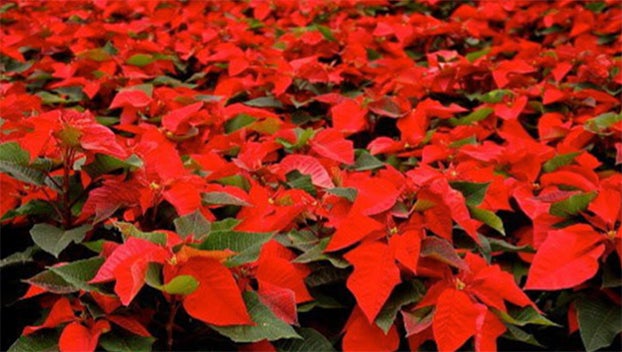MASTER GARDENER — Celebrate holidays with plants; try poinsettias
Published 12:02 am Thursday, December 22, 2022

- Poinsettias create dramatic focal points but grouped en masse, transform into stunning visual marvels. (Courtesy image)
|
Getting your Trinity Audio player ready...
|
Christmas is near at hand, and in case you haven’t noticed this week, winter is no longer “tippy toeing” into Southeast Texas. She’s showering us with her frigid, icy kisses and just in time for many of you (fellow gardeners) have been hoping for more winter-like temperatures.
I hope you’re all happy, your wishes are coming true (I’m muttering derogatory yet inaudible comments about cold weather under my breath)!
If you haven’t already done so, prepare for the colder weather by protecting temperature sensitive plants (move them to an enclosed area or cover them where possible-don’t use plastic), people (dress in layers to stay warm and remain hydrated while exposed to the elements), pets (provide them warm, dry enclosures including adequate food and water or better yet, bring them inside) and pipes (make certain exterior pipes are well-insulated).
According to local meteorologists, a couple days before Christmas, night temperatures will plummet, dropping below 20 degrees F.
On Christmas eve, our daytime high temperature is anticipated to be one degree above freezing! Goodbye mosquitoes-well at least for a few days.
And just in case you’ve missed my personal comments regarding cold temperatures in past articles (I don’t enjoy cold weather), you can keep them as this gardener is heading farther South for Christmas this Year, it’s considerably warmer in South Texas, more than 20 degrees warmer-thank you!
No other holiday plant is more beautiful than Poinsettia. But do you know the history behind the “Flower” that symbolizes Christmas for many of us?
The Christmas Eve Flower or “Flor de Noche Buena”, which is how Poinsettias are known in Mexico & Central America, their native habitat, are woody, tropical shrubs growing to 10 feet. Aztec Indians used the bracts (which are colorful modified leaves) surrounding the small yellow flower centers, as dye, while also using the plants milky, latex sap as medicine, to reduce fever.
During the 17th century Franciscan friars included them in their Christmas celebrations, hence the poinsettias association with Christmas.
The star-shaped patterns of the leaves symbolize the Star of Bethlehem, while the red color represents Jesus’ blood sacrifice.
The plants’ popularity in the United States is attributed to one man, Joel Poinsett, who was the first U.S. Minister to Mexico, a botanist and physician. The plants winter “flower” intrigued him, so in the 1830’s, he carried it with him to his home in South Carolina, for cultivation.
There is no reason to toss away your poinsettias after the Christmas holiday as they are easy to care for year-round.
During the Christmas Holiday keep your Poinsettia in a bright, indirectly lit location inside and water the plant when the potting mix begins to feel dry to the touch while keeping them away from hot or cold drafts.
You’ll want to begin fertilizing after their color begins to fade and always protect from temperatures 50 degrees F or below.
After Christmas through the beginning of fall, place Poinsettias in a sunny location (indoors) keeping the soil barely moist. Trim plants to a height around 8” once leaves begin to fall in Spring while continuing to water and fertilize.
Once new growth appears, repot, and relocate outside, into an area which receives morning sun, and fertilize weekly. Pinch a quarter of the tips of the Poinsettia back to encourage branching and bring plant indoors when night temperatures begin to fall below 50 degrees F.
From the beginning of October to mid-December you must restrict the amount of light the plant receives, which forces it into bloom. To do this, place the plant in a dark place or cover from 4 p.m. to 7 a.m. daily.
You must make certain the plants receive NO light during the daily dark periods! Only provide the plant 6 to 8 hours sunlight daily.
Once the leaf bracts begin setting color, discontinue long nights (dark period) and no longer apply fertilizer. Place the majestic Poinsettia as a grand focal point inside your home and enjoy!
Until next time, so long for now gardeners. Let’s go out and grow ourselves a greener, more sustainable world, one plant at a time! Merry Christmas to each of you!
John Green is a Certified Texas Master Gardener. If you have gardening questions or need more information, contact the Orange County Master Gardeners Helpline at 409-882-7010 or visit txmg.org/orange, Orange County Texas Master Gardeners Association on Facebook or email extension@co.orange.tx.us.





